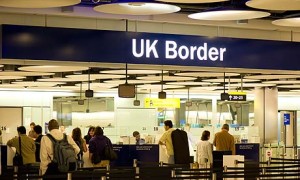Immigration a hot topic in UK election
In tomorrow’s UK general election one of the most hotly contested issues will centre on migration and asylum seekers.
With a recent surge of asylum seekers coming from the Middle East and North Africa into Europe, some people are concerned with the impact that high levels of migration will have on the UK.
But a briefing paper recently released by the Migration Observatory at Oxford University has attempted to address some of these concerns.
The report concludes migration has a small effect on average wages, with wages changing less than half a per cent over the 7-8 years that data was collected.
The report found that immigration only has a negative effect on low-wage and unskilled jobs, with a 1% increase in migrant numbers contributing towards a 0.5% drop in unskilled job wages.
Inversely, it was found that immigration actually leads to an increase in wages for higher paid jobs.
The report also found that the greatest effect of immigration would be felt by workers who are immigrants themselves.
Contrary to the belief of many, the paper found that overall immigration had a negligible impact on unemployment in the UK, suggesting they are not taking jobs away from others.
However it did suggest that immigrants from outside the EU could have a negative impact on the unemployment of UK-born workers, which would be exacerbated during an economic downturn.
The report concluded by arguing that any short-term negative impacts in wages and employment would be offset by long-term gains in those areas.
The reports have proven to be very relevant to the upcoming elections, as immigration seems to be a hot talking point between parties.
Incumbent Prime Minister and head of the conservative Party, David Cameron, has promised a reduction in numbers of immigrants, which are currently at an all-time high.
Net immigration into the UK currently stands at 298,000 per year. Cameron has claimed he will slash that number into “tens of thousands”; however fellow party members claim this to be an ‘ambition’, as opposed to a concrete policy.
The opposition Labour Party has a slightly more liberal stance towards immigration, however they are still planning a number of reforms should they seize power on Thursday.
These reforms include preventing immigrants from claiming benefits until they have lived in the UK for two years, greater border control and deportation of illegal immigrants, and a crackdown in exploiting illegal immigrants in the workplace.
And then there is the UK Independence Party (Ukip) and their leader Nigel Farage, who plan to have an extremely hard line policy on immigration should they come into power.
Firstly, their immigration policy would involve the UK leaving the EU, in order to “take back control of our borders.”
They would require all immigrants to be able to speak English and find accommodation before moving to the UK, as well as making private health insurance mandatory.
They also plan to cut back on welfare benefits for immigrants, and bringing spouses and children to the UK to live will become much harder under the Ukip.
Farage voiced his concerns about immigrants on Wednesday, saying the current European migrant boat crisis could lead potential IS militants to settle in the UK.
While encouraging David Cameron and Labour leader Ed Millibrand to opt out of any common European asylum policy, he claimed that “we face a direct threat to our civilisation if we allow large numbers of people from that war-torn region into Europe.
“We’ve got to a point here with this where, unless we stand up and say something, we will be opening up our doors not just to many more people but to the Islamic extremist threat,” Mr Farage said.
As of now the Conservatives and Labour are neck and neck in the polls, with a minority Labour government predicted to be the most likely outcome.
Robbie Wallis
AMES Staff Writer













